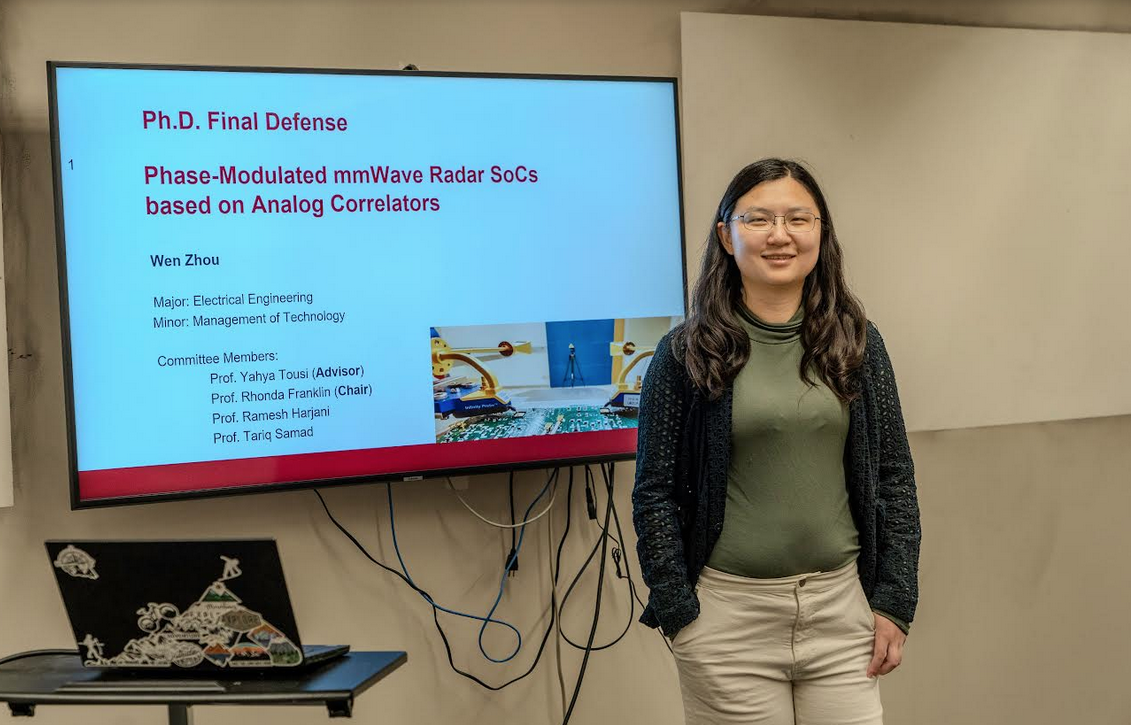Wen Zhou: First Ph.D to Complete MOT Minor

Congratulations to Wen Zhou, who successfully defended her doctoral thesis last week! Wen is the first Ph.D. candidate to complete TLI's Management of Technology minor.
She received her B.S. in electrical engineering (instrumentation) from the Nanjing University of Aeronautics and Astronautics, and her M.S. in electrical engineering (RF and Microwave) from the University of Minnesota in 2015 and 2019, respectively. Her research interest includes mm-wave IC design, sensing system, and bioinstrumentation
Q: What did you study for your Ph.D, and what was the subject of your thesis?
A: My major is in Electrical Engineering and the subject of my dissertation is: Phase-Modulated Millimeter-Wave Radar SoCs based on Analog Correlators. My advisor Prof. Yahya Tousi and I proposed an innovative radar architecture for millimeter-wave distributed sensing. We spent six years together developing the theory and the prototype system-on-chips of this proposed idea. We have completed the proof-of-concept design and the qualitative validation, and have reached the point of integrating the POC design into a full-functioning radar sensor module and conducting quantitative evaluations.
Q: What drew you to the Management of Technology minor, and how do you feel it was helpful for you?
Q: After I completed the idea proposition and the system design of my research project, I encountered challenges in project planning and tasks breakdown. Back then, moving from a conceptual idea to the realization on silicon looked overwhelmingly complex. To figure out the pathway from idea to prototype, I started to explore graduate level coursework in project management and found the MOT program. Then after the consultation with MOT faculty, I started taking MOT courses and declared it as the minor.
The MOT program exposed me to the full design cycle of innovation process. I took project-based courses on new product design and business development, product innovation and management, financial accounting and corporate venturing. I also audited courses in organization development and technology policy.
The knowledge I learned from the MOT courses effectively guided the direction of my research. We methodically compiled a list of essential features for a minimum viable system, and then implemented the feature list in our radar system-on-chip design, and successfully demonstrated the functionalities of our designed radar system. In the later phase of the project, when we were working on the refinement of the design, we were also following the guidelines to factor in more practical considerations and focusing on the full-solution delivery. The MOT program also made me aware of the business potential of the project. I have also explored the value proposition and the product-market fit of our research project during my free time.
I strongly believe that MOT should be integrated into graduate level engineering programs. My personal view of the mission of higher education is not only to build technical expertise in specific domains, but also to provide candidates the visions of how to direct our expertise to better serve the communities. The MOT curriculum fills in the gap between the technologies we develop in the lab at the U and the real-life needs.
Q: What are your plans post-Ph.D?
After Ph.D. I will join the R&D lab of Samsung Semiconductor at San Diego to work on mm-Wave system architecture. I believe it is a good match to my technical background and research interest, where hopefully I can make direct contributions to the team from the early design definition stage to the product commercialization stage.
I will also make the most of the nice weather in San Diego and explore outdoor opportunities. Still, I will definitely miss the lakes in Minnesota. I have not finished my adventures here yet--snowkiting on the lake and entering the sea caves along Lake Superior shoreline on foot are still on my bucket list.